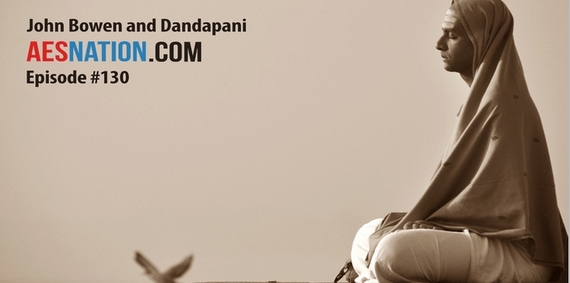It can feel near impossible sometimes to manage all the responsibilities we have and do so in a way that actually brings us joy. How can we get the most out of life with the people we care about most, at our companies and at home?
Some of the best answers to that question that I've heard come from an unlikely source: Dandapani, a Hindu priest turned entrepreneur who has become one of the most respected authorities on self development.
After living as a Hindu monk for 10 years at a traditional monastery in Hawaii, Dandapani moved to one of the most challenging environments he could think of -- New York City -- with a passion to show others how to apply what he learned as a monk in their businesses and personal lives in order to grow as entrepreneurs, spouses, parents and people.
Dandapani recently shared with me three insights that can help all of us achieve greater success in the key areas of our lives.
1. Manage your energy like you manage your money. No matter how wealthy you are, you still have a finite amount of money -- and typically you stop and think before you spend or invest a bunch of cash, right? The key is to do the same thing with another finite resource: your energy. "Energy is a limited resource that you want to allocate wisely in people and things, especially if you own a business" says Dandapani. "People are always looking to take energy from entrepreneurs because they're so good at building things and solving problems."
His advice is to ask yourself: If I'm going to invest my energy in someone or something, are they going to do something with my energy that gives me a return on my investment?
Dandapani likens this approach to a task we all know well: Raising capital. "How many people would write you a check for $2,000 without asking any questions? Most people will demand to know where the money is going, what your business plan is and so on," he says. "When someone asks for your time and energy, do the same thing and treat the request like a business proposition."
One way to do that is to only give advice with strings attached. Dandapani explains: "When you give someone advice, don't stop there -- always give them something to do, like a simple action they should take based on your advice. Then if they come back to you two months later and ask you for more advice, the first thing you ask them is, 'Have you done what I told you to do?'. Ninety-nine percent of the time, the answer is no. That's when you say, 'I would love to give you another piece of advice, but, unfortunately, it's totally dependent on the first action being done'."
On the flip side, go out on your way to help those who do execute and then come back to you. "They've shown a commitment to doing something with the energy that you invest in them," he says.
2. Get serious about concentration. Can we all finally agree that multitasking is not the way to maximize efficiency or effectiveness? And yet, how often do you find yourself shifting between three, four (or more) responsibilities at a time? The fact is, focus and concentration take practice -- but few business owners and their teams have ever been taught how to concentrate. "If you don't teach someone how to do something and they don't practice it, how will they ever be good at it?," asks Dandapani.
His advice: Every day, practice doing one thing -- just one thing -- at a time so it gets your undivided attention. When talking with a client or team member, turn off your monitor and turn down the sound on the computer. When conversing with your spouse, have your phone in the other room. "It sounds so simple, but monks like to keep it simple and uncomplicated because the simpler you can keep a lesson the more likely you will implement it into your life," says Dandapani.
Note: Practicing concentration regularly means doing more than a five- or ten-minute mediation each morning. It's something you need to keep doing throughout your day. "You can't eat a carrot in the morning and then eat pizzas and hamburgers throughout the whole day and expect to be healthy," adds Dandapani.
3. Identify your life's purpose. An often misunderstood concept, your life's purpose is something that you should carry with you throughout your entire lifespan. That means it can't be one of entrepreneurs' usual suspects, such as your company, spouse or children. As Dandapani puts it, "Your true purpose should never be dependent on anything or anyone."
The reason: Every one of those things could potentially go away -- you might sell your company, and your spouse or children could die. If those things happen, some or all of your purpose is lost.
The key to identifying one's true life's purpose, says Dandapani, is to first get to know yourself. Start by spending time with yourself each day in a period of quiet reflection. The more you understand yourself, the more insights you'll have on what your purpose is.
Knowing your life's purpose also helps you know what you don't want -- and who you don't want -- in your life. Armed with those insights, you can do an even better job at investing your energy in all the right ways.
Looking for a sustainable edge that will help catapult you over the competition? Check out the insights, tactics and actionable strategies from today's top entrepreneurs at AES Nation.
